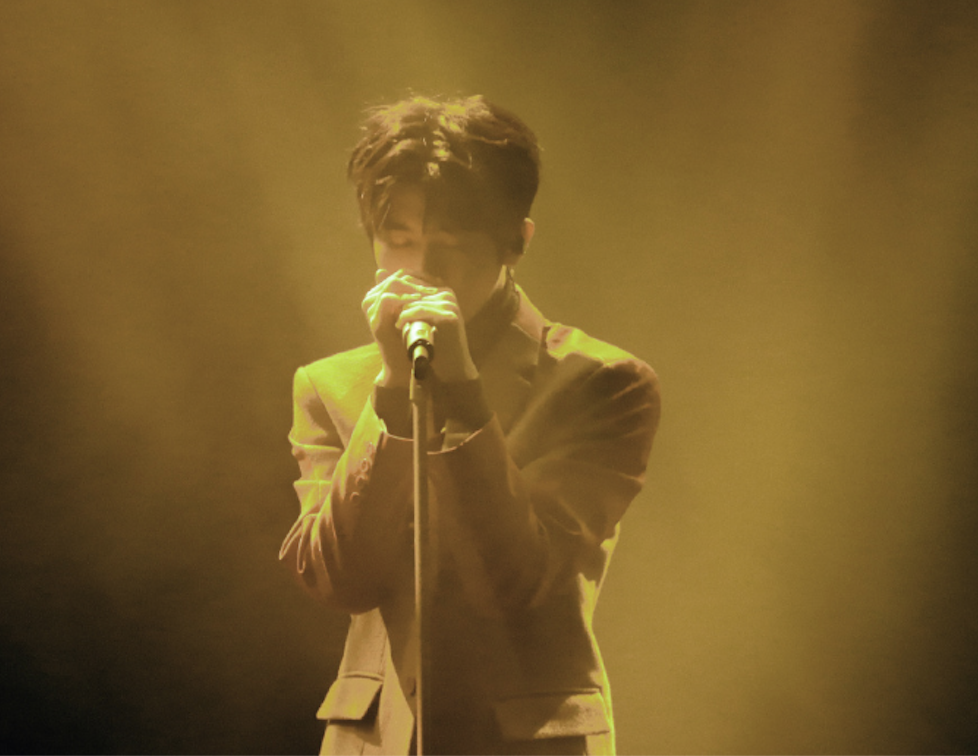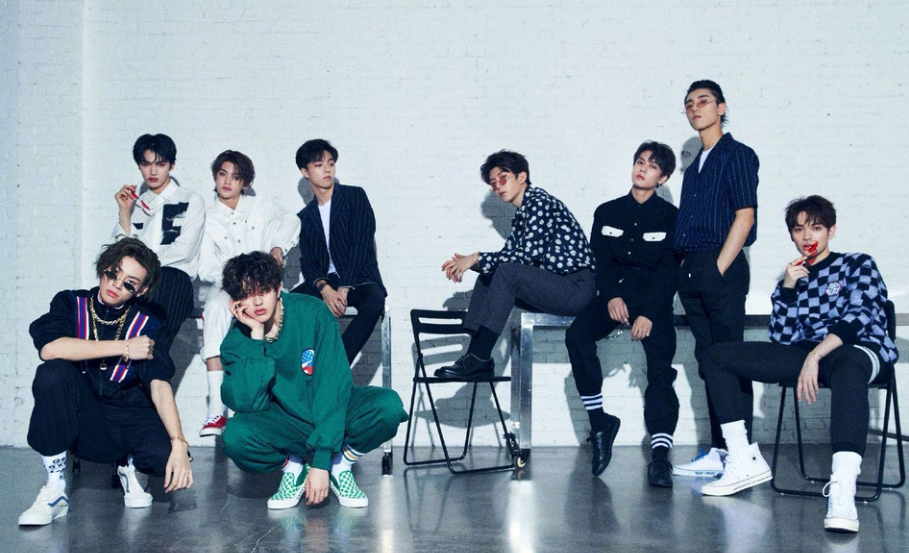The following is from the latest issue of the Full Stop Quarterly. You can purchase the issue here or subscribe at our Patreon page.

On the day of Idol Producer’s grand finale, tens of thousands of people witnessed the hug between Chen Linong and Cai Xukun. It happened on April 6, 2018. In order to watch the live broadcast of this episode with C, my girlfriend at the time, I got up at five in the morning. Across the sixteen-hour time difference, we awaited the same moment, each in our own grad school dorm. During the final ranking, Cai Xukun was revealed to have won first place, and Chen Linong second. After all the winners were announced, Cai Xukun held his arms wide open towards Chen Linong, who quickly took the cue and embraced him, carrying him off the ground and spinning him in circles several times, their cheeks pressed firmly together.
“Just like how you would spin me,” C commented.
But I didn’t reply, too taken by this moment. Their cheeks. I could see the tender flesh squeezed, piling around their cheekbones. There was no mistaking the fact that they were laughing. Their cheeks are so soft, I thought, and despite being so close already they grip and hold on as if demanding to get closer, as if they have given this one long hug their everything.
I have to read some fan-fics about them, I thought. Maybe write some too.
I never did respond to the comparison C had made between them and us. She was angry at me for a week.
Chen Linong and Cai Xukun were two of the nine winners of Idol Producer, a Chinese reality TV show where one hundred male trainees, mostly young boys around the age of twenty (twenty-four was considered “old”), competed to secure a spot in a new boy group. Their rankings were determined partially by their performances, but more importantly through fan voting. The show aired between January and April, with a total of twelve episodes. For the finale, every trainee, whether on stage or not, wore the same uniform they had worn in the very first episode. It had come to be known as the “school uniform”: light grey pants and jacket, white shirt. So when Chen Linong carried Cai Xukun off the ground, they were not only soon-to-be pop idols, but also two overjoyed boys at their commencement. Tonight, the words “happy graduation” were posted over and over again on social media, shouted over and over again by the live audience, as if it was truly the end of a school year. In reality, it marked the end of winter and the winners’ first day as Nine Percent, a group scheduled to be active for eighteen months and then permanently disband.

It is peculiar to see so many twenty-year-olds dressed identically and moving in perfect synchrony. Performing the theme song at the start of each episode, the trainees hold their hands out, look at the camera, smile, greet those watching the show, and bow at the exact same moment at the exact same degree for the exact same amount of time. It is so precise that when they straighten their upper bodies there comes a small whooshing sound, the result of one hundred human bodies traveling through air simultaneously, following the same track. This pursuit of discipline and unison as an aesthetic standard is truly something to be found in a Chinese high school, where the daily routine of a student includes radio calisthenics and jogging around the track and field in a square formation. Inspired by the disciplined structure of the show, many popular Chinese fan-fictions in the Idol Producer fandom are set in fictional high schools. Among them, If I Die stands out because it drastically exaggerates the negative aspects of the school environment. This piece, posted three days after the finale, is centered around Chen Linong and Cai Xukun’s life in a prestigious yet mysterious high school: Cai Xukun transfers to this school, which is famed for its high college entrance rate, only to realize that the student who gets the last place in the monthly exam will be bullied by everyone else. Other students will isolate him, sometimes pour soup over his head, and even cut his ear with scissors. To make it more horrifying, the students seem to go out of their way to ensure that someone else comes in last place. After Cai Xukun tries to stop the bullies, they lock him up in the gym so he won’t be able to attend the exam. Just as he gives up hope and lies down on the floor, Chen Linong comes to his rescue, holding a key stolen from the office and a textbook marked with everything that’s going to be on the exam.
Despite its darker spin, If I Die and Idol Producer unfold in much the same way. Although they don’t face physical bullying (at least not on screen), the Idol Producer trainees are similarly competing for a limited number of spots. At the end of each episode, they are divided into different “classes,” ranging from A to F. After the ranking is revealed, those with the least votes are sent home. Yet while it is ultimately still a competition, the show puts an emphasis on how the trainees make friends in their dorm life and help others through difficult times. The fan-fiction, in a similar way, utilizes the hostile environment of the school as a backdrop for relationship building. The crucial difference is that what the show presents, and ultimately markets, as mutual empathy and friendship, the fan-fiction pushes further and claims as potential queer love. At school Chen Linong and Cai Xukun act indifferently towards each other, but after school they gather at Chen Linong’s place for a homemade dinner and then rest in his room, lying side by side on the small bed. It is only when they are inside this safe haven, far away from the ruthless schoolmates and all the classes and tests, that time begins to slow down, and the readers realize that the world of these characters extends beyond this school where everything hideous happens repeatedly as if in an infinite loop. In a similar way, the fans of Idol Producer speculated about the off-screen lives of the contestants. During the show’s three-month run, tens of thousands of people changed their daily routines just so they could watch and vote, and once the show ended, they found themselves at a loss. Although the quasi-high school space did impose certain physical and mental pressure on the trainees, it also brought them together through something very close to comradeship. Now that the pressure was lifted, many wondered what would happen to the emotional bond these trainees had formed in that short time. Written right at this moment, its setting and storyline an easy parallel with the show, If I Die serves as a reminder that speculation, specifically queer speculation, does not end with the finale.
My first attempt at coming out to my mother happened in a cafe where some seats — eight of them to be accurate, two at each table — were swings. Those four tables lined up along the window, and they were always the first to be occupied. Everyone seemed to like sitting on a swing while drinking coffee, so it was lucky of us to claim one of those tables on that day. It was early summer. I was fifteen, fresh out of junior high, going into a high school only ten minutes’ walk from home. Neither of us ordered coffee. We were sipping milk tea, swinging back and forth so slightly because even though the seats were merely a foot or two above the floor, the strings thick as my arm, we were afraid they might fall. I remember us laughing, and it was because of this laughter, the nonchalance, the happiness, that I wanted to tell my mother one of my secrets. But I didn’t really tell her what I wanted to. I was afraid and, already afraid of the potential fall, it felt like too much fear combined. So I told her something else. I told her I read and wrote fan-fictions; not just any kind of fan-fictions, but those about two boys, or two men, being in love. Sometimes they were characters in anime, and sometimes they were pop idols. I had discovered fan-fictions a couple of years ago, and almost instantly they became my natural response to any moment of interaction that touched me, that contained in it emotions I could sense but not put my finger on. Frequently I turned to fan-fictions as a means to process these emotions, to see how they might be articulated, to understand what it was exactly that made me feel lighter in my body. I remember being very nervous in revealing this to my mother, as if this act by itself would explain everything about me that my mother didn’t know.
My mother didn’t know that I would soon fall in love with D, the first girl, the first person I’d ever loved, who was to be followed by several other girls in the decade to come. I would love her for almost five years, from our first year in high school to our second in college. I would follow her to America and even to the same city because she wanted me close by but was too straight to love me. When I told my mother I read and wrote male-male fan-fictions she was mostly unmoved. “As long as you’re not part of it,” she said.
Because how could a girl insert herself into the imaginary mutual attraction between two boys? At first, I really couldn’t. It was the kind of story, the kind of love and desire, that lay entirely out of myself. But watching Idol Producer ten years later, with the help of the school uniform and the isolated environment where the show was recorded, where every boy had to share a dorm room with a few other boys, it became for me a utopian high school, a version of high school that had not been accessible to me, or C, or most of the people who watched every episode with avid enthusiasm. For some, none of the boys in their high school were as good-looking or put half as much effort into maintaining their appearance; for others (e.g. me), the high school never had this much queer potentiality. In an actual high school such as my own, under the real world pressure of being accepted into college, there was much more emphasis on “minding your own grades” than on any form of interaction between students. Friendships that were close to the point of raising suspicion were discouraged as well. My Chinese teacher once told me, in all seriousness, “You should stay away from D.” Since no context was given, I still don’t know whether he meant D could be a bad influence because she was considered a “bad student,” or because I loved her. As a fifteen-year-old, I loved her in a way that was nearly impossible for anyone to miss. Years later, my best friend from high school told me, “I thought it was strange that you were in love with a girl.” In Idol Producer, on the other hand, bonding with one’s fellow trainees was not only encouraged, but even required, since one would always perform in small groups instead of by oneself. Though far from a direct nod to queer love, this dynamic opens a space for the viewers to imagine an entirely different, more tolerant school environment where stories can happen. As writers and readers of fan-fic well know, to write is to re-write, to bend time, to insert oneself into a queer narrative that is both already-impossible and newly-possible through the projection of desire onto fictional proxies.
So far, more than ten thousand Chen Linong/Cai Xukun fan-fiction works have been posted on Lofter, a website best described as the Chinese hybrid of AO3 and Tumblr. Among them, Quit Smoking is the most popular. Divided into three chapters, the first posted in mid-March and the last shortly before the show ended, the piece has received an average of seven thousand likes and hundreds of comments per chapter. One and a half years later, people still come back to read it again and write down the date in the comments. It tells a fairly simple story: having gone through their respective divorces, Cai Xukun’s father marries Chen Linong’s mother, and the stepbrothers instantly take to each other. Over time, that attraction grows romantic. After the death of Cai Xukun’s father, Chen Linong catches his stepbrother indulging in cigarettes, “turning to the bitterness to numb the pain.” Chen snatches the cigarette from the older brother’s hand and puts it out on his own arm, saying, “Don’t even think about it. From now on, every time you want a cigarette, I’ll kiss it out of you.” And then, they kiss. “Things couldn’t be worse anyway, so we might as well go to hell together,” Cai Xukun says. Of course things can, and do, get worse later in the story. But at least in this alternative universe, the readers are promised a happy ending from the very beginning, a piece of information provided in author’s notes. Such is the case with more and more fan-fictions nowadays: the considerate author will usually disclose whether the main characters end up together at the end of a piece, so that to choose to read a story is also to choose a specific kind of ending.
I wasn’t only choosing a happy ending, though. While browsing through hundreds of new fan-fictions posted after the finale, it was the beginning of Quit Smoking that drew me to the piece: “Cai Xukun hasn’t gone back to his hometown for seven years.” Seven years was the same length of time that I had been away from home as well. The more I read, the more I began to see myself in this fiction. Similar to If I Die, Quit Smoking takes place mostly in a high school. The main plot line is nowhere close to my life, but there are certain details that brought back memories both recent and distant, so much so that I ended up getting unexpectedly attached to the piece.
Once during a track meet, I ran the 4 x 400 meters relay for D. Her name was on the list, but she was feeling sick that day. I handed her the jacket of my school uniform and took the last lap. It was the last year of our high school, and she hadn’t come to class for a while. I hit the track and ran and as I was running I thought of the exams she was preparing for, which would take her to a country very, very far from me, farther than if every lane on this track were to be stretched straight and hammered together to create a rubber bridge. I thought of how she was already in love with a boy from America. I ran and I kept passing those in front of me. In that lap I passed five runners and finished in second. D skipped toward me, carrying my uniform and a bottle of water, and I still think of this while reading how Chen Linong confronts a girl holding Cai Xukun’s uniform jacket, demanding that she “give it back.” The incident, as we learn from our all-knowing perspective, leads to his first realization that he is romantically attracted to his stepbrother. This gesture recurs a few times throughout their junior high and high school years, as Chen Linong claims Cai Xukun’s uniform jacket to be “something only he can carry.” If anything, the high school in this fan-fic is especially utopian because of its extreme material lack that results in the projection of extra layers of meaning onto the most mundane objects available. On that day, I wanted D to hold my uniform because to me it symbolized more than what it was, because it seemed like nothing else could be such a convenient, instant proof of intimacy. The fact that this uniform jacket means, to both of the characters in Quit Smoking, what I alone had wanted it to mean, makes up for my unrealized—that is, unreciprocated—fantasy. In deliberately choosing a story with a happy ending, I am granted this consolation of knowing it can happen: that a jacket can be a shared symbol and expression of adolescent queer love. It did not happen to me, but in the fic it can happen, and happens to two boys not much older than I was back then.
Later in the piece, Chen Linong loses part of his memory due to an accident, and things unsurprisingly get worse. His mother pleads Cai Xukun not to tell him what their relationship had been. “I knew you had a very strong bond, and I didn’t dare to break you two apart…” she says. “But this time he has already forgotten about it, so please, let him go. The two of you are brothers in my mind, and others think so too… Please don’t drag him back into the mud. I am begging you as a mother. Please give my son back to me.” After this confrontation, Cai Xukun flies to America and doesn’t go home for the Lunar New Year for seven years. Yet he does sneak back one winter, four years into his self-imposed exile, just so he can take a look at Chen Linong from a distance.
I was once very close to doing a similar thing. Sometime during my fifth year in America, I got together with C, who lived in China. That winter I had planned to sneak back home, so I could visit her for two weeks. Unlike Cai Xukun, I failed because my mother found out about my plan. In the same way that Chen Linong’s mother pleaded Cai Xukun to keep the secret between them, my mother pleaded me not to tell my father. She said, “This is the sacrifice you have to make for your family. You must prioritize your family because although you love your girlfriend, it is the result of irrationality.” So I said nothing. My father never knew we had been together, even after our breakup. When I opened Quit Smoking, my intention wasn’t to read myself into this happy ending, but a small part of me couldn’t resist doing just that.
Despite the pleasure of identification I felt in reading this fan-fiction, I still feel unsettled, even betrayed, by a few moments throughout the story. I remember reading it the very first time, shortly after it was posted, and its ending nearly shocked me. Cai Xukun returns home after graduation and finds out that Chen Linong has all his memory back, while their mother has close to none. She is afflicted with Alzheimer’s disease and calls everyone she sees, “Cai Xukun,” apologizing repeatedly for pushing him away. It is under this circumstance that Cai Xukun and Chen Linong gain enough courage to confess their unchanged love for each other. The happy ending made possible partially, if not predominantly, by the erasure of a mother’s memory, by reverting her brain back to “when she was a carefree flower, well taken care of by their father.”
And as much as I relate to the symbolic significance of the school uniform, when Chen Linong succeeds in reclaiming Cai Xukun’s jacket, it is always taken from a girl, someone Cai Xukun has initially given it to. Every time, Chen Linong realizes that he doesn’t want “some random girl” to touch something that belongs to “his brother,” and every time he grabs the jacket with such force that the girl is scared and starts to cry. When Cai Xukun returns from the track or the basketball court to a crying girl next to Chen Linong, he teases his younger brother, “See, you made a girl cry! No girl will like you if you keep doing this,” to which Chen Linong replies, “I could care less.” Then they go home on the same bike, and the incident is brushed over. The piece is so popular that thousands must have seen that it is all right, even necessary, to hurt anonymous female characters so that the protagonists, two young boys, can eventually unite in love.
It is nearly impossible for me to remember my high school without remembering boys being pitted against girls, the two crudely divided groups seeing themselves as antagonists, always in competition. The former was frequently described as “too mischievous to spend enough time studying but very smart,” the latter as “not as smart but more mature and very hard-working.” Such competition wasn’t part of Idol Producer, which could only resemble an all-boy high school, unfamiliar to most of the fan-fiction writers. When a fan-fiction takes places in a fictional high school, it is still one that is based on reality, and in this reality female classmates frequently become an obstacle the male characters need to fight off, causing trouble because they often “come to understand love sooner due to their maturity, and tend to come up with schemes because of this maturity.” Such a scenario, one or both of the boys having (many) female admirers they carelessly, even cruelly, reject in order to demonstrate or just realize their love for each other, has become all too familiar to fan-fiction readers and writers. It is surprising when very rarely a female-male friendship is present in, let alone maintained throughout, a piece. Of course we know such an all-boy high school with close to no conflict between one hundred boys could only exist in or directly as a function of a utopia, but we are drawn to it nonetheless.
When Produce 101, a show with a similar structure but 101 female trainees instead, premiered exactly half a month after Idol Producer ended, the audience would soon find the girls fighting, arguing amongst themselves, much more often than the boys. Though performances were also mainly in small groups, more trainees got criticized for “wanting to stand out,” and there was less emphasis on their bonding moments than on their disputes. Thus, even on TV, viewers like me are denied the same access to a directly relatable queer utopia. And turning to something like the fandom of Idol Producer as a partial substitute, I repeatedly encounter rejections that aren’t even aware of themselves as such, just like the way many had carelessly expressed their expectation of Produce 101 before it first aired, “I’m here to watch the girls fight.”
I had never wondered what my second attempt at coming out would be. More than ten years passed between the two incidents, enough to render my original strategy invalid. In recent years, changes in the set of vocabulary adopted by fans to describe their idols seem to have counteracted the queerness of fan-fictions. I can no longer simply offer my reading and writing of fan-fictions as a substitute for a direct “confession.” Yet in a way, we still circle back to them, my most familiar means of queer self-expression.
My second attempt at coming out was very brief. Seeing that my mother had found out about my plan to sneak back, I told her C was my girlfriend. She made that comment about prioritizing family over irrational love. Then several days later, out of nowhere, she said, “Tell me something about the two of you.”
At first, I didn’t know what she meant. “Like what?” I said, confused.
“Anything: what you do when you see each other, where you go, what you talk about,” she said. “It doesn’t matter. Tell me something so I know you two are just like other people.”
This request, my mother’s request for detailed retelling of my dates with C, I found it funny. But I couldn’t laugh, so I held my breath. It felt as if my mother was asking me to write a piece of fan-fiction about me and my girlfriend. And maybe, what if this is part of what fan-fiction does, to make a queer relationship seem “just like” a heterosexual one, in the sense that it can also be sweet and normal? I wanted to laugh because my mother was willing to go through a queer text, probably for the first time ever, so she could pick out something familiar to her and know that her daughter was normal.
I thought I could have showed her some of what I wrote about Chen Linong and Cai Xukun, which was based on not only my imagination of two boys being in love but also things that had happened to me and C. Through those stories about two strangers, my mother would come to know what my girlfriend and I did when we saw each other, where we went, what we ate, what we talked about, the ideal pet we had decided on, the kind of house we wanted. Imagining my body, not added in between, but in place of one of the boys’, and C’s in place of the other’s, my mother would learn something about how it felt for her daughter to have sex with another woman. But how it feels is not how. There is no readily available answer in description alone, imaginary or realistic, of queer love, and no description without its own limitation.
It used to be that, if you told your classmates you wrote or even just read fan-fictions, their first question would always be, “So are you gay?” And many, including me, were quick to deny that what they read or wrote had any association with their own sexual orientation. But now I suspect that, if I showed my mother any of the most popular Chen Linong/Cai Xukun fan-fictions, she would have no doubt that I am straight. In the fandom of Chen Linong/Cai Xukun, the slash is more than the indicator of a romantic relationship. It stands for the strict definition of who is the top and who is the bottom, and in defining these two terms, two factors frequently come into play: the ways in which a writer understands their own (imaginary) relationship to the subjects, and the stereotypical masculine versus feminine characteristics.
Though Chen Linong was only seventeen when he first appeared in Idol Producer (Cai Xukun was nineteen), he was already six feet one and very strong. In one of the episodes where every trainee took turns punching an arcade machine, he got 490, the highest score out of everyone. Cai Xukun, on the other hand, despite his consistent high ranking and outstanding stage performances, slipped and only got 280; he also seemed even thinner than most of his competitors, who already had fit and “camera-ready” figures. To a large number of other fans, this difference in strength easily becomes evidence of an apparent top/bottom division. In both If I Die and Quit Smoking, it is mentioned repeatedly that, when Chen Linong takes hold of Cai Xukun’s hand, the latter can’t shake loose; when he wraps his arms around Cai Xukun’s waist, the tight embrace hurts though not meant to. And Cai Xukun is “the beautiful rose with thorns, refusing to be approached because of their mother’s opposition.”

Following the same line of description, in In Name Only, many times the gender of this “Cai Xukun,” who is frequently the center of school-wide gossips, is intentionally made ambiguous. In this piece of fan-fiction posted more than a year after the show, the mean schoolmates accuse Cai Xukun of having slept with multiple boys in the grade above, leaving their girlfriends heartbroken. In their words, Cai Xukun is a “beautiful and arrogant slut,” and initially Chen Linong believes them. As they begin to have more direct interactions, however, he slowly realizes that Cai Xukun is shy, innocent, and never defends himself against the biased rumors because he is too mature to argue with those kids.
A love story between a masculine boy and a feminine boy is, indisputably, still queer. In the Chinese Chen Linong/Cai Xukun fandom, it is paradoxically an originally queer desire that makes fan-fictions appear almost heterosexual. Not uncommonly the fan-fiction writer, being a young woman, desires the male pop idol defined here as bottom, in the sense that she fantasizes about him being her female lover, sometimes referring to him as “my wife” in daily conversations. It is one of the effects brought about by the “weakening” of traditional masculinity in how a lot of male pop idols present themselves: these young boys often appear with feminine makeup and outfits and pose in ways that are intentionally vulnerable, going for a specific type of androgynous beauty. Cai Xukun is an especially suitable subject for such a queer desire because he pushes his self-presentation further than others, doing photoshoots in organza dresses and smeared bold red lipsticks. In the practice of fan-fiction writing, however, instead of writing oneself directly into one’s fantasy, writers like the author of In Name Only choose to realize their desire through Chen Linong, a male character and a strict top in the story. Originating from female fan-fiction writers who call a male pop idol “my wife,” this desire eventually manifests itself in narratives that read heterosexual because its realization still relies on a male body, because a writer may decide against letting her female body take that dominant place. Such a story is queer in a very specific way, and to some fans/readers, its binary in character representation risks being taken at face value. If the author has warned the readers in author’s notes that Cai Xukun may read like a girl in a story (e.g. In Name Only), it is not the reader’s responsibility to decipher the hidden structure of desire. A reader, or an outsider like my mother, will probably only see the unthreatening story of a boy falling in love with someone who appears to be a girl.
The top/bottom binary is not heterosexual, but it is frequently interpreted in a male/female manner during the process of meaning-making, where male equals top and female equals bottom. As part of the daily vocabulary in this specific fandom, whenever either of the two idols releases new photo shoots, many fans will quickly comment on if Chen Linong is “manly,” and Cai Xukun “womanly.” The usage of these two words and the character depiction in fan-fictions feed into each other. They go hand in hand with a familiar resemblance of male-female romance. Thus retelling and reimagining become disguised, harder to see.
Shortly before their last concert as Nine Percent, Cai Xukun released a new single, “Dream,” written for the band’s second and last group album. Though collaborating with two Korean composers, Cai Xukun wrote all the lyrics himself. The song tells a story of the protagonist’s failure to get over a heartbreak:
Where will you be now / maybe more in peace without me
Can’t unlock the knot in my heart / dumping half of my coffee
Even the four seasons have gone by twice
Before sunrise / there has to be a snowfall
But no one will care / this scene from a date long gone
Please before sunrise / let the snow fall one last time
But no one will remember / this scene from a date long gone
(transl.)
Then the line, “not in love with you,” is repeated multiple times (in English).
Upon its initial release, some Chen Linong/Cai Xukun fans were surprised to find that the song could have been a partial retelling of Quit Smoking: in the fan-fiction, Cai Xukun agrees not to tell Chen Linong they are lovers and escapes to America; coming home in secret several years later, he chances upon the first snowfall that winter. But even without this particular association, the song still promises an open interpretation. Its exclusive use of first and second person pronouns leaves the narrative full of ambiguity in terms of gender, and Cai Xukun has chosen to sing it in a voice that calls to mind that of Faye Wong, the Chinese singer-songwriter frequently referred to as “the Diva.”
Yet when he performed this single in the concert, Cai Xukun used as his prop a full-body female mannequin wearing a white wedding gown and lace veil. Holding its hands and carrying it, he waltzed the mannequin out of a small glass house on stage, into the center of the spotlight. The whole song ended in an artificial snowfall, as Cai Xukun reaches for a snowflake with one hand, his face saddened by the impossibility of this longing. The performance was very well received among fans, especially the ones whose fantasy was, predominantly, to enter a romantic relationship with their idol. Since a majority of the fans were female, many called the performance “a wedding with fans on stage,” with the mannequin read as a symbol of those female fans.
I avoided watching the live broadcast of this concert, nor did I watch any of the fan-recorded videos. I didn’t want to find this specific performance embarrassing, or worse, funny. Opening it for the first time a few months later, it still seems funny that a song completely ambiguous with regard to gender should be used in a performance that evokes the epitome of conventional heterosexuality. The female mannequin in a wedding gown clearly, albeit temporarily, negates the queer possibility that could have claimed the space. It becomes a reminder that, though one can dwell in a fan community where everyone wants to cast their idols in queer love stories, such fans are still just a small part of the whole. Pop idols will always be required to, at the very least, perform the fantasy which appeals to the maximum number of fans.
However, to say that he has the responsibility to perform in a certain way is to say that Cai Xukun, as the idol of those audience members, is merely fulfilling the job of maintaining his public persona. Every TV show he appears in, every song he writes and sings, everything works together towards the construction of a consistent persona. Ultimately then, it is the fans who have the possibility of presenting a more complete narrative. Faced with a lack of information about their idol, it is almost inevitable that they should turn to fiction.
While re-watching the video, despite my initial disappointment, I begin to wonder why so many other fans had been so appreciative of the performance. How do they resolve, in their mind, the sadness embedded in the lyrics? What are their reactions to the stiffness of the mannequin, to the fact that, as their surrogate, it does nothing besides standing rigidly? The lack of natural interaction between Cai Xukun and the mannequin, paired with a song of unrequited love, makes the “wedding” quite a puzzling one. So puzzling, in fact, that one might reach to the lyrics in search of an alternative interpretation, and find themselves with a hidden narrative that echoes the story of Quit Smoking.
I have watched this video many times since, and wonder now if perhaps Cai Xukun’s performance of “Dream” accomplishes something that is sought by many Chen Linong/Cai Xukun fan-fictions but achieved by only a few: the ability to render the seemingly clear ambiguous again. It is not uncommon to see fan-fiction writers falling back into those same narrative and representational models they set out to rebel against. This performance, on the contrary, underscores the way that genuine queer re-imagining relies on the existence of disparate, often irreconcilable, interpretative possibilities. Rather than limiting or overdetermining fans’ interpretations, the idol’s persona can actually serve to open a broader speculative space. Fan-fictions will always emerge from this space, and they will always reflect the vocabulary available to the writer within a specific fandom, a product of that community’s collective imagination. Only through such collective efforts will we arrive at the means to dissect what’s provided, to twist and bend it, to make it more compatible with unconventional forms of wanting and desire.
Yuxin Zhao is a writer currently living in California. Yuxin writes experimental prose and personal essays, some of which can be found on Rivulet Journal; Three Forms of Exhaustion, a chapbook, is forthcoming.
This post may contain affiliate links.







